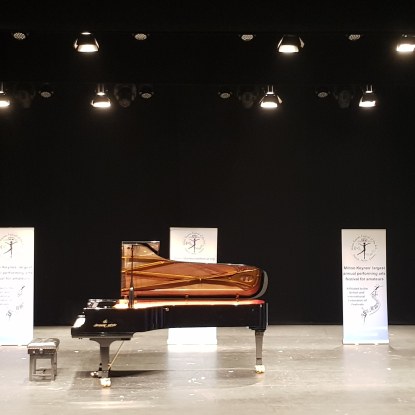Stage presentation is an important topic, not just for those who perform regularly, but also for students preparing for exams, diplomas, or school concerts and festivals. In my latest article for Pianist Magazine newsletter (which you can sign up for here), I offer the first of two articles on stage presentation, with a few ideas for honing and developing a more assured approach to performing. I hope it’s of interest. You can read the original here.
 This topic might, at first glance, appear frivolous, but it’s important for many reasons, not least to illustrate how we should ideally conduct ourselves onstage. But it also helps various aspects of our piano playing, from choice programming to addressing that all-consuming issue; learning to focus whilst playing. It’s for these reasons that this ‘5 Top Tips’ article is the first of two on the subject. These tips are reminders for anyone giving concerts, taking exams or diplomas, participating in music festivals, or just playing for family and friends.
This topic might, at first glance, appear frivolous, but it’s important for many reasons, not least to illustrate how we should ideally conduct ourselves onstage. But it also helps various aspects of our piano playing, from choice programming to addressing that all-consuming issue; learning to focus whilst playing. It’s for these reasons that this ‘5 Top Tips’ article is the first of two on the subject. These tips are reminders for anyone giving concerts, taking exams or diplomas, participating in music festivals, or just playing for family and friends.
- Before you play a note or even prepare to play a concert, some thought must be given to programming. What will you play? Your programme choice will reveal your personality, and for an audience, may or may not attract them to your recital. A balanced programme is a good idea, but it can be more adventurous to include some Contemporary music. This is especially true when programming for a diploma exam. For a 35 minute diploma recital, why not consider adding 10 minutes of new music. It doesn’t have to be dissonant or atonal music; there are plenty of Contemporary composers who write in an essentially tonal style.
- When discussing your next performance, how do you feel? Excited? Fearful? Probably a mixture of the two. The best way to overcome fear is to keep exposing yourself to it; if you can perform regularly, it starts to take on an element of routine. Whilst routine shouldn’t equate to boredom, repeated performances will help to extinguish nerves, and allow you to feel more in control on stage.
- Another way to alleviate any potentially negative psychological aspects of performing, is to really fall in love with the piece or pieces that you intend to play. This is why it is paramount that you connect with your chosen repertoire. Ask yourself the following: why do you want to play your piece? Do you love it? How does it make you feel? If you feel a strong attachment to your repertoire, then you will be keen to communicate this with your audience, which can detract from the worry and fear associated with performing.
- Should we address our audience on stage? Some performers prefer to walk on stage and just play, whereas others like to talk to their audience, establishing a connection and informing them about the repertoire. I played classical recitals on cruise ship for many years, and one facet which was crucial to the success of a performance was talking to my audience. Even if you just briefly explain what you are going to play, it sets the audience at ease and, hopefully, brings them into your space.
- What will you wear to your concert? Attire is important, adding a sense of occasion. Comfort is crucial, and high heels may not be a good idea for all ladies! Aim to find a style which allows you to move freely, but without looking too casual. In my opinion, a concert is an event, therefore smart is the order of the day. Again, this is especially important if taking a diploma, as certain examination boards mention that suitable attire will be taken into consideration during the exam.
My Publications:
For much more information about how to practice piano repertoire, take a look at my two-book piano course, Play it again: PIANO (Schott). Covering a huge array of styles and genres, 49 progressive pieces from approximately Grade 1 – 8 level are featured, with at least two pages of practice tips for every piece. A convenient and beneficial course for students of any age, with or without a teacher, and it can also be used alongside piano examination syllabuses too.
You can find out more about my other piano publications and compositions here.
from Melanie Spanswick https://ift.tt/2NqJI0w
No comments:
Post a Comment